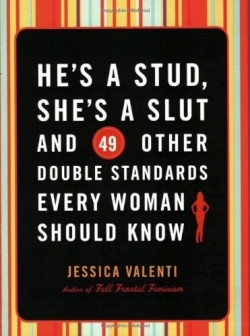He's a Stud, She's a Slut, and 49 Other Double Standards Every Woman Should Know
The double standard has been around, it seems, since Adam and Eve. After all, they both took bites of the apple, but only one has taken a sound thrashing for it ever since.
In her exploration of the double standards we see every day, feminist Jessica Valenti weaves together personal anecdotes with a call to action. If it’s possible to rout this standard habit from the repertoire of human action, she would make a stellar flag bearer, and indeed, has enough fire and wisdom on the topic to run the whole parade.
Valenti, author of Full Frontal Feminism: A Young Woman’s Guide to Why Feminism Matters, and executive editor of the blog site Feministing.com, brings her formidable background in women’s studies and activism to the issue, but admits early on that it wasn’t her work in nonprofits like Planned Parenthood that prompted her fascination with the double standard.
“When I was in high school, I had a reputation—a bad one,” she writes. “It felt, at the time, like the reputation…had materialized out of nowhere. And I was confused.” That experience helped to shape her fascination with how the prevailing culture puts men and women into different categories, even when they act in the exact same way.
The examples she uses are familiar and widespread: he’s tough, she’s a tomboy; he’s a bachelor, she’s a spinster; he’s angry, she’s PMSing; he’s successful, she’s a showoff. Perhaps the most widely cited is the “he’s the boss, she’s a bitch” scenario, which has been the subject of countless editorials in the past decade.
But although Valenti trods familiar ground, she brings a fresh quality to the literature: pure, unadulterated anger. This isn’t an objective treatise on cultural trendsetting or socioeconomic indicators; it’s a manifesto that frequently features swearing, sarcasm, vitriol, and venom.
And it works. Valenti writes with such passion and righteous indignation, that it’s akin to hearing an excellently written speech by someone who feels like the world could change, if people would stop being so apathetic. At the end of each chapter is a short paragraph under the heading “So what to do?” and it’s here that she’s at her sharp, witty best.
For example, in terms of bad moods, she states simply, “Be as pissed off as you want to be. Don’t hold back because you think it’s unladylike or some such nonsense. We shouldn’t be shamed out of our anger. We should be using it.” Fortunately for readers, Valenti has taken her own advice.
Reviewed by
Elizabeth Millard
Disclosure: This article is not an endorsement, but a review. The publisher of this book provided free copies of the book to have their book reviewed by a professional reviewer. No fee was paid by the publisher for this review. Foreword Reviews only recommends books that we love. Foreword Magazine, Inc. is disclosing this in accordance with the Federal Trade Commission’s 16 CFR, Part 255.

